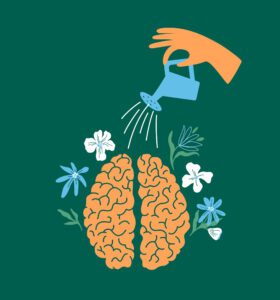
In today’s fast-paced world, where stress, anxiety, and distractions seem to be constant companions, many people are turning to mindfulness and meditation for mental clarity and emotional well-being. Science increasingly supports these practices, showing that mindfulness and meditation can profoundly impact mental health. Whether you’re new to these techniques or have been practicing them for years, understanding their mental health benefits and how to incorporate them into daily life can lead to lasting changes.
What Are Mindfulness and Meditation?
Before diving into the mental health benefits, it’s essential to understand what mindfulness and meditation are and how they differ.
Mindfulness is the practice of being fully present and engaged in the moment, aware of your thoughts, feelings, and surroundings without judgment. It’s about embracing the present, whether it’s the sound of the wind, the taste of your food, or the sensation of breathing.
Meditation, on the other hand, refers to a broader set of techniques that often include mindfulness but can also involve specific practices like focused attention, loving-kindness, and body scanning. It’s a structured method of training the mind, often involving quiet reflection.
The Science Behind Mindfulness and Meditation
Numerous studies have confirmed the powerful effects of mindfulness and meditation on the brain and mental health. These practices are scientifically proven to reduce symptoms of stress, anxiety, depression, and even chronic pain. Let’s look at some of the research:
- Reduced Stress: One of the most well-documented benefits is stress reduction. Studies have shown that mindfulness-based stress reduction (MBSR) programs can lower cortisol levels, the body’s primary stress hormone.
- Increased Grey Matter: MRI scans have shown that regular meditation increases the density of grey matter in brain regions linked to learning, memory, and emotional regulation.
- Enhanced Focus and Attention: Meditation strengthens the brain’s ability to focus and sustain attention by training it to stay present. This is crucial for reducing feelings of overwhelm and anxiety.
- Lower Anxiety and Depression: Mindfulness practices help people step back from negative thought patterns and break cycles of rumination, which can contribute to anxiety and depression.
- Improved Emotional Regulation: Research from Harvard University found that mindfulness meditation helps people regulate emotions more effectively, reducing impulsivity and negative reactions.
The American Psychological Association has also acknowledged the therapeutic effects of mindfulness and meditation, emphasizing how these practices can alleviate mental health issues such as depression, PTSD, and anxiety disorders.
Mental Health Benefits of Mindfulness and Meditation
Here are some of the most significant mental health benefits:
- Reduced Anxiety and Depression Mindfulness and meditation help us observe our thoughts without attaching emotional reactions to them. This distance allows us to recognize and redirect negative thought patterns, helping manage anxiety and depression. Studies show that people who meditate regularly experience less emotional reactivity, leading to reduced symptoms of anxiety and depression.
- Enhanced Emotional Well-being Mindfulness encourages acceptance and non-judgmental awareness of your emotions. By acknowledging your feelings without being overwhelmed, you improve emotional regulation. Over time, this practice leads to increased emotional resilience and a more positive outlook on life.
- Better Sleep Quality Poor sleep is often a result of racing thoughts or stress. Mindfulness and meditation practices, such as body scanning or breathing exercises, help calm the mind before bed, leading to deeper, more restful sleep. Research shows that individuals practicing mindfulness experience fewer sleep disruptions and report better overall sleep quality.
- Increased Focus and Concentration One of the key benefits of meditation is its ability to enhance focus. By training the mind to concentrate on the present moment, mindfulness improves attention span, memory, and decision-making. This can lead to increased productivity and reduced feelings of overwhelm.
- Lower Stress Levels Mindfulness-based practices have been linked to significant reductions in cortisol, the hormone that contributes to stress. Regular meditation also lowers the body’s overall stress response, allowing you to manage life’s challenges more effectively and calmly.
- Boosted Self-awareness Mindfulness helps us become more attuned to our thoughts, feelings, and behaviors. This self-awareness can help uncover habits or thought patterns that might be detrimental to our mental health. With this insight, we can make healthier, more intentional choices.
- Decreased Symptoms of PTSD For people dealing with trauma, mindfulness and meditation can provide a safe space to process their emotions. Research has found that mindfulness practices help reduce intrusive thoughts, flashbacks, and emotional numbness commonly associated with PTSD.
- Improved Relationships Mindfulness encourages empathy and compassion, not just for ourselves but for others. These qualities can lead to healthier, more fulfilling relationships by promoting active listening, patience, and understanding.
Techniques That Work: How to Incorporate Mindfulness and Meditation Into Daily Life
Now that we’ve explored the benefits, let’s talk about how you can integrate these practices into your routine. You don’t need hours of practice daily to experience the rewards; small, consistent efforts can make a big difference.
- Mindful Breathing Start with the basics. Focus on your breath for a few minutes each day. Sit in a quiet place, close your eyes, and pay attention to each inhale and exhale. This simple technique calms the mind, reduces stress, and helps ground you in the present moment. Set aside 5-10 minutes in the morning or before bed to practice mindful breathing.
- Body Scan Meditation This technique involves mentally scanning your body from head to toe, paying attention to any areas of tension or discomfort. The body scan is a great way to connect with your physical sensations and release any built-up stress. It’s often used as part of mindfulness-based stress reduction (MBSR) programs.
- Mindful Eating Eating mindfully involves slowing down and truly savoring each bite. Pay attention to the taste, texture, and smell of your food. This practice enhances your relationship with food, improves digestion, and reduces overeating.
- Gratitude Meditation Practicing gratitude boosts mental well-being by shifting your focus to positive aspects of your life. In a quiet space, reflect on the things you are grateful for. This practice can improve emotional well-being and help cultivate a positive mindset.
- Walking Meditation Walking meditation is a simple yet effective technique that allows you to practice mindfulness while moving. Focus on each step, the sensation of your feet touching the ground, and your surroundings. It’s a great way to clear your mind and relieve stress.
- Loving-Kindness Meditation This practice involves silently repeating phrases of goodwill toward yourself and others, such as “May I be happy” or “May you be at peace.” Loving-kindness meditation cultivates compassion, empathy, and emotional balance.
Practical Tips for Success
- Start Small: Begin with just a few minutes a day and gradually increase the duration of your practice. Consistency is key, so make it a habit by integrating mindfulness into daily activities, such as drinking your morning coffee or taking a shower.
- Set a Routine: Choose a specific time each day for mindfulness or meditation, whether it’s in the morning, during lunch, or before bed. Consistent practice is essential for reaping the long-term benefits.
- Use Apps and Resources: There are many apps available, such as Headspace, Calm, and Insight Timer, that offer guided meditations and mindfulness exercises tailored to your needs.
- Be Patient: Don’t expect immediate results. The benefits of mindfulness and meditation build over time, so be patient and compassionate with yourself as you develop your practice.
- Create a Comfortable Space: Find a quiet, comfortable space where you won’t be disturbed during your practice. Setting up a dedicated spot can help reinforce the habit.
Conclusion
Mindfulness and meditation are more than just wellness trends—they’re powerful, science-backed practices that can significantly improve mental health. By reducing stress, enhancing focus, and promoting emotional well-being, these techniques offer a holistic approach to living a more balanced, peaceful life.
Whether you start with just five minutes of mindful breathing or dive into more advanced practices like loving-kindness meditation, the key is consistency. With time, these practices will become a valuable part of your daily routine, leading to lasting mental health benefits. Begin your journey into mindfulness and meditation today, and experience the transformative effects for yourself.


No responses yet